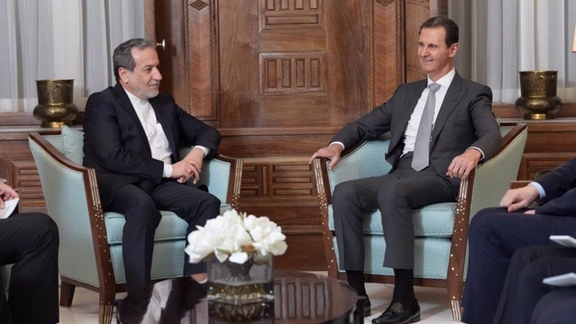Iran assures Assad of its full support in fight against rebels

Iran's foreign minister met the Syrian president in Damascus on Sunday to express Tehran's continued support for the Bashar al-Assad government in the wake of Aleppo's swift capture by armed rebels.
"The Islamic Republic will insist on its principled stance to fully support the Syrian government, nation and army in the fight against terrorism and safeguard regional security and stability," Abbas Araghchi said in his meeting with Assad.
Assad, in turn, thanked the Iranian foreign minister for his "meaningful" visit to Syria under the current circumstances, according to Iran's readout of their talks.
Following the meeting, Araghchi told reporters that the two sides discussed "the details of the support Syria must receive."
"I conveyed Iran's message of support for Syria and for Bashar al-Assad himself... It is natural for the situation to be difficult, but the courage and spirit of the Syrian president were admirable," he said, adding that they had reached "good understandings."
Iran has played a major role in the Syrian civil war, aligning itself with Assad's government against various opposition groups since the conflict began in 2011.
Tehran provided substantial military support, including advisors, ground troops, and militia fighters from across the region, helping Assad win back much of the territory his forces had lost by 2020.
Between the March 2020 Idlib ceasefire and late 2024, frontline fighting mostly subsided. However, the recent capture of Aleppo by Hay'at Tahrir al-Sham (HTS) and its allied groups may convince Tehran to reinforce the Assad government again.
"Whether Iran will send forces to Syria again, similar to what it did in the past, depends on future circumstances and the decisions of the country's senior officials," Esmaeil Kowsari, an IRGC general-turned-lawmaker who sits on the Parliament's national security and foreign policy committee, said on Sunday. "However, the Resistance Front will definitely become active in Syria."
The Resistance Front refers to the alliance of armed militant groups sponsored by Iran, including Hezbollah, Hamas, the Palestinian Islamic Jihad, Houthis in Yemen, and Iraqi Shiite militias. For now, Hezbollah and Iraqi militia seem to be the only forces who are positioned to join the Syrian government's fight against rebels.
Iran rallying regional support for Assad
Iran's President Masoud Pezeshkian on Sunday had a phone call with Iraqi Prime Minister Mohamed Shia Al-Sudani, during which he expressed Tehran's preparedness for cooperation with regional states in the fight against armed rebels in Syria.
"These kinds of events are part of the sinister plans of the Zionist regime (Israel) to promote insecurity, discord, and conflict within Islamic countries. This issue has made the alignment and joint efforts of the Islamic Ummah to prevent the spread of terrorist trends in the region an essential task," Pezeshkian said in the phone call.
Earlier in the day, he had urged Islamic countries to intervene in Syria to prevent further internal conflict, saying that they should not allow this conflict within an Islamic country to persist.
Next stop: Ankara
After meeting Assad and dining out in a restaurant in Damascus in an apparent message of calm in Syria, Araghchi left Damascus for Ankara to discuss the Syria developments with Turkish officials.
Turkey is known as a key supporter of Syrian rebels who have captured Aleppo over the past few days, and had given a green light to the offensive, Reuters reported citing opposition sources in touch with Turkish intelligence.